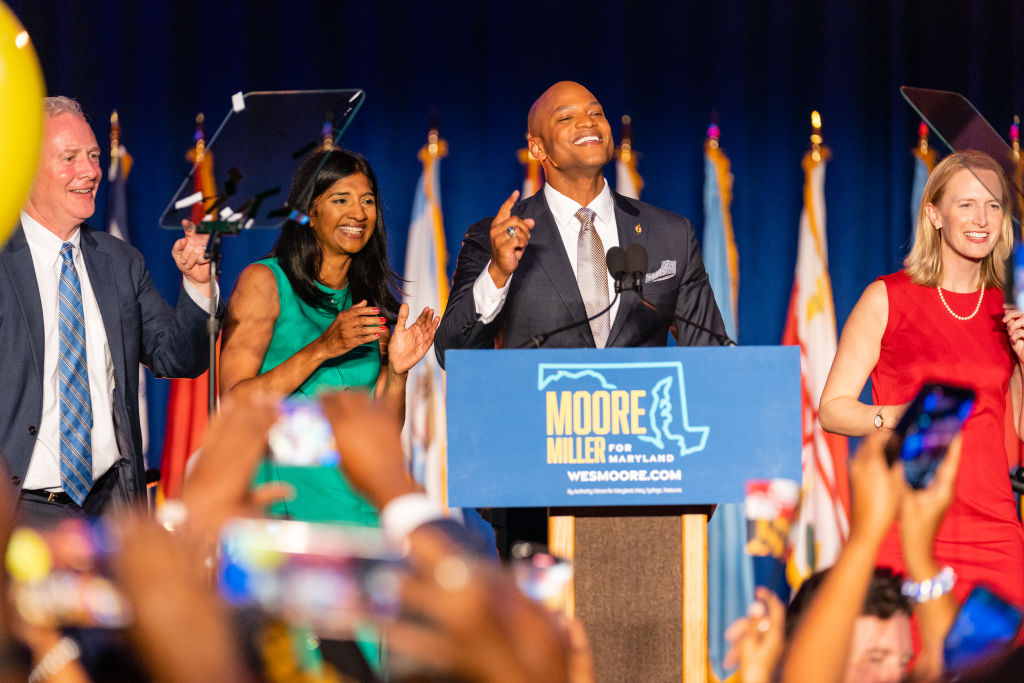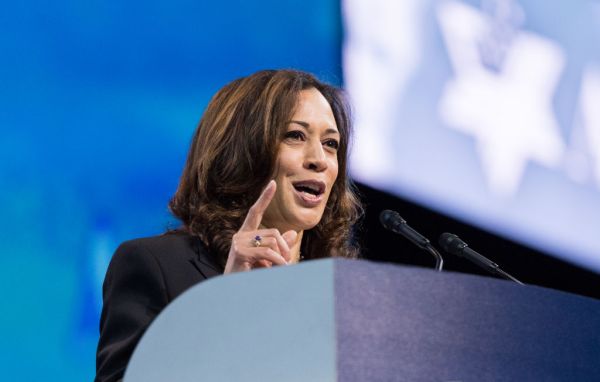Democrats had a stronger Election Night than many analysts anticipated, buoyed in part by Trump-endorsed Republican candidates who performed worse than expected. But in six instances—three gubernatorial races, two House races, and one Senate race—Democrats actually participated in the process of selecting those Republican candidates by spending money in their primary campaigns. This cynical bet paid off.
Meddling of this nature isn’t unprecedented—in 2012, for instance, Missouri Democratic Sen. Claire McCaskill’s campaign boosted Todd Akin in the Republican primary before beating him in the general election. But many of the GOP candidates Democrats aided in this cycle believe, or until recently believed, that the 2020 election was stolen from Donald Trump—adding an extra layer of hypocrisy to Democrats’ efforts as they simultaneously campaigned as the pro-democracy party.
Democrats spent more than $53 million boosting Trump-aligned candidates in 13 races in nine states. Of those 13, six won their primaries and advanced to Tuesday’s general election. All six lost.
Dan Cox, a member of the Maryland state legislature and the state’s Republican gubernatorial candidate, vocally supported Trump’s claims of a stolen election, arranged for his constituents to be bused to the Trump rally in Washington, D.C., on January 6, 2021, and tweeted during the attack on the Capitol that Mike Pence was a “traitor.” After Cox received Trump’s endorsement, the Democratic Governors Association ran ads describing him as “too close to Trump, too conservative for Maryland.” Democratic groups spent a total of $1.7 million in the race, in which Cox defeated the moderate candidate preferred by incumbent Republican Gov. Larry Hogan by more than 8 points. The general election was no contest: Democrat Wes Moore, a celebrity author and political newcomer, soundly defeated Cox, returning Democrats to the governor’s mansion after Hogan’s eight-year tenure. Moore will be Maryland’s first black governor.
Democrats, led by incumbent Gov. J.B. Pritzker and the Democratic Governors Association, spent $34.5 million on the Illinois Republican gubernatorial primary backing Darren Bailey over Richard Irvin. Bailey defeated Irvin, the moderate mayor of the Chicago suburb of Aurora who would have been the first black governor of the state if elected. Bailey’s extreme views, including election denialism and comments minimizing the horror of the Holocaust relative to lives lost from abortion, proved an easier foil for Pritzker, who had no trouble defeating Bailey Tuesday.
A similar story unfolded in New Hampshire, though with a smaller price tag of $3.2 million. Retired Army Gen. Don Bolduc narrowly won the Republican nomination over Chuck Morse, the more moderate candidate endorsed by popular incumbent Gov. Chris Sununu (who easily won reelection Tuesday). Almost as soon as he advanced to the general, Bolduc backed away from his prior claims of a stolen election in 2020 to the more wishy-washy territory of acknowledging Biden as the “legitimate” president while maintaining that there was some fraud. The Democrats’ investment may have saved them money in the long run: Bolduc lost badly to incumbent Democratic Sen. Maggie Hassan.
Also in New Hampshire, Democrats spent $100,000 to help Robert Burns, who won the GOP primary in his district by less than 3 points over a moderate, pro-choice alternative backed by Sununu. Burns wasn’t formally endorsed by Trump until late October, but he had long aligned himself with the former president. Burns lost to incumbent Rep. Ann McLane Kuster.
In Pennsylvania, Democrats spent $1.2 million, including on ads aired by Josh Shapiro’s campaign tying Republican Doug Mastriano to “what Donald Trump stands for.” Shapiro went on to beat Mastriano by double digits.
The Democrats meddling in Michigan’s 3rd District generated the most controversy. Incumbent Peter Meijer was one of only 10 Republican House members to vote to impeach Trump in the aftermath of January 6—but he lost his primary to Trump-aligned candidate John Gibbs after the Democratic Congressional Campaign Committee spent $425,000 boosting Gibbs. Pre-election forecasts suggested that the race was likely to end up being the closest of the six “MAGA meddling” races. On Tuesday, Gibbs lost by 8 points to his Democratic opponent Hillary Scholten, who had run an explicitly moderate campaign.
The takeaway is both obvious and discouraging. “This was a winning strategy for the Democrats,” Grand Rapids business leader and former Republican political operative Michael Lomonaco told The Dispatch.
“Hopefully this is a wake up call for the GOP” in the states and districts where Democrats meddled, he added. “It should be common sense, but districts like MI-03 are simply not going to send an extreme or polarizing candidate from either side of the aisle to D.C.”









Please note that we at The Dispatch hold ourselves, our work, and our commenters to a higher standard than other places on the internet. We welcome comments that foster genuine debate or discussion—including comments critical of us or our work—but responses that include ad hominem attacks on fellow Dispatch members or are intended to stoke fear and anger may be moderated.